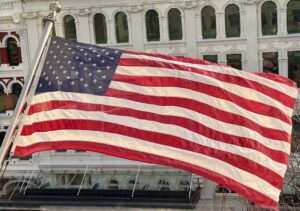Patriotism and national pride are essential components of American identity, vividly expressed through numerous celebrations and traditions. Among these, Flag Day stands as a potent symbol of the nation’s reverence for its flag and the ideals it represents. Officially inaugurated in 1916 and later codified as National Flag Day by Congress in 1949, the June 14th observance offers Americans a moment to ponder the flag’s historical and cultural import. Though not as widely recognized as Independence Day or Memorial Day, Flag Day presents a unique lens for exploring how parades, flag-raising ceremonies, educational activities, and community events contribute to a collective sense of unity and identity. This essay argues that Flag Day’s diverse ceremonies underscore the significance of patriotism and national pride in the U.S., as they reinforce communal allegiance to the American flag’s emblematic values of freedom, democracy, and resilience.
The celebration of Flag Day unfolds through numerous time-honored traditions and ceremonial practices that encapsulate the essence of patriotism and national pride across the United States. Communities engage in flag-raising ceremonies where citizens converge to pay tribute to their national symbol, nurturing a spirit of unity and reverence. Parades stand as another defining feature of Flag Day, characterized by vibrant displays of American flags and patriotic music, aimed at bolstering public morale and solidarity. Educational activities conducted in schools are particularly impactful, as they educate younger generations about the flag’s historical significance and associated values. This educational focus does more than enlighten students; it also imbues them with a sense of duty to uphold national ideals. These observances indicate that patriotism transcends mere symbolism, elevating it to a shared experience grounded in communal participation and rituals. As such, these practices during Flag Day demonstrate how Americans renew their national pride while affirming their allegiance to foundational democratic principles that unify them.
In summary, Flag Day offers a compelling testament to the persistent relevance of patriotism and national pride within the American ethos. The myriad traditions and ceremonies observed on this day—spanning from parades and flag-raising events to educational programs and community gatherings—serve not only as rituals but as profound expressions of collective identity centered on principles such as freedom, democracy, and resilience. Through the observance of Flag Day, Americans across varied communities reiterate their shared allegiance to the values embodied by their flag. Though it may not command the prominence of holidays like Independence Day or Memorial Day, Flag Day encapsulates a vital aspect of America’s narrative: the constant reaffirmation of unity and commitment to foundational values. Moving forward, it is clear that sustaining such observances is crucial for nurturing an engaged citizenry committed to these ideals in both tranquil and turbulent times. Ultimately, Flag Day functions not just as a historical commemoration but as a critical opportunity for recommitting to the enduring tenets that define American democracy.

